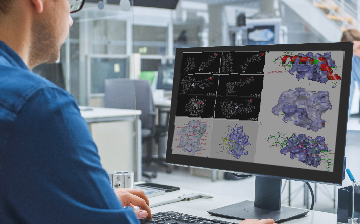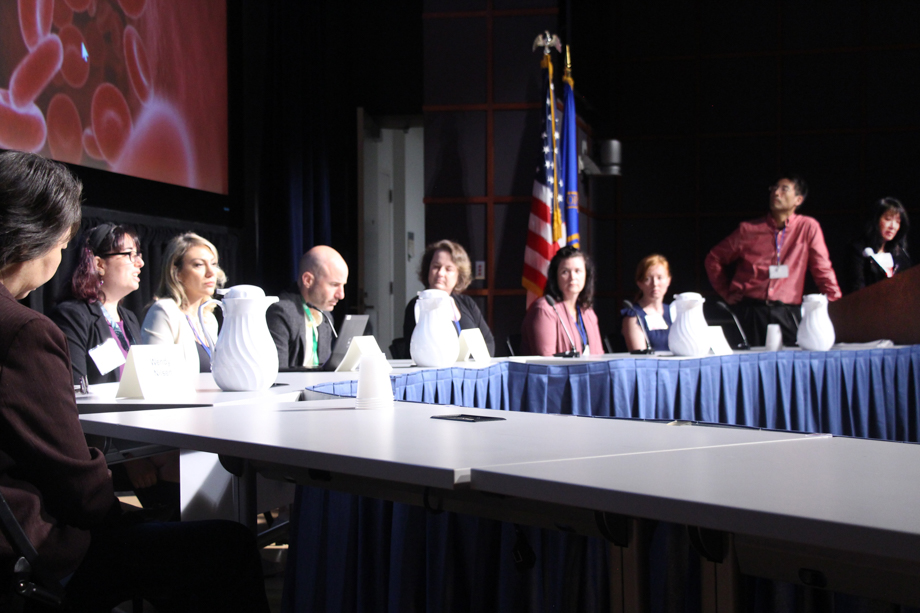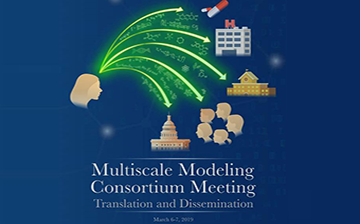
Background
In April 2003, the Interagency Modeling and Analysis Group (IMAG) was formed; starting from a working group comprised of program staff from nine Institutes of the National Institutes of Health (NIH) and three directorates of the National Science Foundation (NSF). IMAG now represents over 100 program staff from multiple government agencies in the United States and Canada.
Since its creation, this group has convened monthly through virtual meetings and at various locations of the IMAG participants. All IMAG participants are involved in managing research programs in biomedical, biological and behavioral systems that require the development of new and novel modeling and analysis methods.
The Multiscale Modeling (MSM) Consortium
In 2003, the IMAG recognized that the modeling community was on the forefront of thinking across the biological continuum, rather than just focusing at one scale or level of resolution. In addition, the IMAG identified a strong desire among modelers to form multi-disciplinary partnerships across varied research communities. This led to the development in 2004 of the Interagency Opportunities in Multiscale Modeling in Biomedical, Biological, and Behavioral Systems Solicitation. The 24 awardees from this solicitation subsequently formed the MultiScale Modeling (MSM) Consortium in 2006. The MSM Consortium has now grown to include over 100 projects relevant to multiscale modeling.
View all MSM Consortium Activities on the IMAG wiki.
Agenda and presentations from the 2023 meeting are available on the IMAG wiki. Peruse photos from the meeting here.
Announcements
-
NIH to Inject Healthy Bolus of Data to Sustain the Future of AI for Medical Discoveries October 1, 2021 in SIAM News
-
Multiscale Modeling and Viral Pandemic Working Group published perspective paper Mar. 12, 2021 in Science.
- Review article published Feb. 18, 2020 in the Archives of Computational Methods in Engineering.
- Meeting perspective paper published Nov. 25, 1019 in NPJ Digital Medicine based on the Oct. 24, 2019 ML-MSM meeting.
- Tromberg Touts Computational Modeling at Meeting NIH Record, May 3, 2019
- Winners of the 2019 Next Top Model Video Competition announced March 13, 2019.

Notice of Funding Opportunity Announcements (NOFO)
Our wiki page contains information relevant to the IMAG (Interagency Modeling and Analysis Group) and the MSM (Multi-scale Modeling Consortium) To join contact Dr. Grace Peng.
All researchers are welcome to join individual Multiscale Modeling Consortium Working Groups by contacting the Working Group Leads listed on each group page.
Models to predict protein biomaterial performance
David Kaplan, Tufts University Medford
Multiscale Modeling of Wound Healing
Jason Haugh, North Carolina State University Raleigh
Microconnectomics of neocortex: a multiscale computer model
William Lytton, Suny Downstate Medical Center
Predictive Multiscale Modeling of Microbial Consortia Biofilms
Ross Carlson, Montana State University - Bozeman
Multiscale Modeling of Facet Capsule Mechanobiology
Victor Barocas, University of Minnesota
Related News
While pacemakers have treated many patients with heart rhythm disorders, their bulky design and use of wires limits their usefulness and poses a risk of heart damage or infection. Now, researchers have cut the cords, shrunk the size, and expanded the capabilities of current designs.
Artificially causing – or inducing – labor is becoming increasingly common, yet this practice comes with risks and its level of success is difficult to foresee. But now, new research may offer a way to help predict outcomes and improve the process.
The Interagency Modeling and Analysis Group (IMAG) celebrated its 20th year during the two-day annual IMAG Multiscale Modeling Consortium meeting in late June at the Natcher Conference Center and via virtual attendance. Source: NIH Record.
Scientists at Duke University supported with funds from NIBIB have developed an ultra-fast photoacoustic imaging system capable of visualizing functional and molecular changes in the brain related to major brain disorders.
NIBIB's Grace Peng provides an overview of the new NIH Bridge2AI program in an interview with Mimi Geerges. Source: Government Matters
Save the date for the annual NIH Synthetic Biology Consortium Meeting.
The 2024 IMAG Multiscale Modeling Consortium meeting is September 30 - October 2, 2024. The theme is: Setting up teams for biomedical digital twins.
The Synthetic Biology Consortium was formed as a place for researchers and stake holders interested in the synthetic biology field to interact and share ideas with each other, as well as to facilitate bringing synthetic biology researchers to the NIH.
The third installment of the NIBIB National Technology Centers (NCBIB) Webinar Series showcases four centers specializing in optical imaging and spectroscopy methods and applications of Artificial Intelligence applications in biomedical research and clinical translation.
Come to Washington, D.C., for the return to our in-person IMAG Multiscale Modeling Consortium (MSM) meeting!









